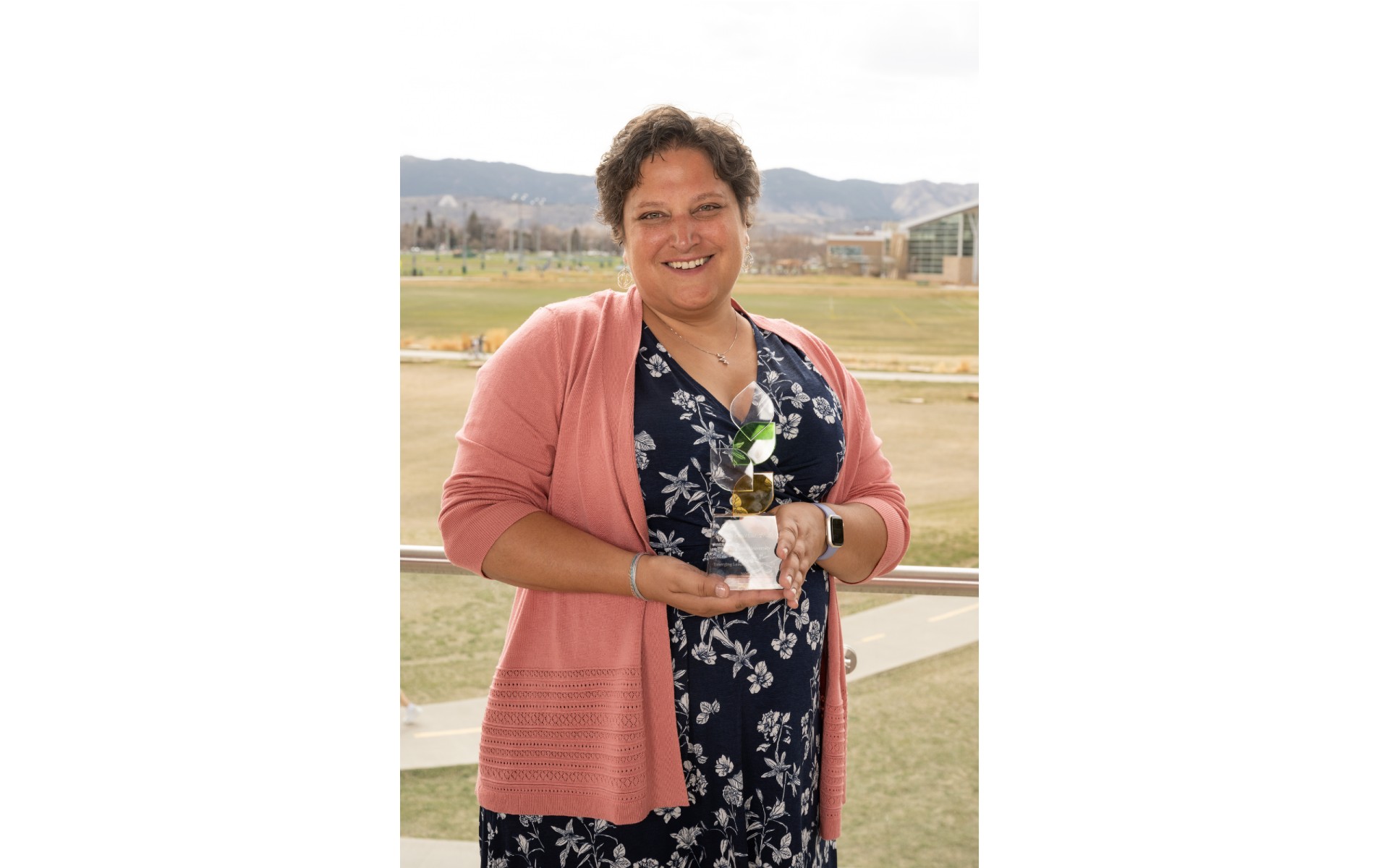
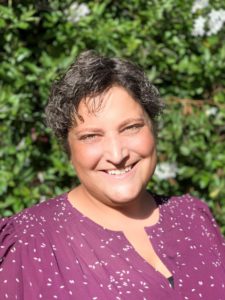
Editor’s note: On February 26, 2023, the limits of current medical treatments were reached and Anne R. Crecelius died peacefully from metastatic breast cancer in hospice care at home surrounded by her loving family. She documented her journeys through travel, academia, and cancer on her blog.
Anne Crecelius (M.S. ’09, Ph.D. ’13) is intentional about applying lessons she learned as a graduate student in Colorado State University’s Department of Health and Exercise Science to all areas of her life. She has used her research skills to become an outstanding teacher, and creates meaningful connections with colleagues and students, fostering balance and adventure. Like her research on how the human body meets demand for oxygen, she models how to use personal resilience and her network of support to balance her professional drive for leadership, mentorship, service, with her own health.
Honoring her leadership in physiology education and research, expertise and advancement of student advising, and education outreach activities, the CSU College of Health and Human Sciences has named Anne Crecelius its 2022 Emerging Leader Alumna.
Say ‘yes’ mentality
Crecelius is a leader at the University of Dayton in the Department of Health and Sport Science where she is an associate professor. Her commitment to leadership also extends to national roles where her “say ‘yes’ mentality” has led to service on multiple committees of the American Physiological Society. Further, she has engaged with the development of a new national Center for Physiology Education and co-leads social media for the Advances in Physiology Education journal.
“Anne’s leadership in these groups has been far-reaching,” said Crecelius’s nominator, Erica Wehrwein, associate professor of physiology at Michigan State University. “Both the American Physiological Society and the Physiology Majors Interest Group are international groups with global impact.” Wehrwein lauded Crecelius for championing national guidelines for advising in pre-health programs.
As part of her committee service to the American Physiological Society, Crecelius also chairs the Advising Committee for the Physiology Majors Interest Group tasked with writing national guidelines for advising for physiology and pre-health degree programs, drawing from firsthand experience supporting physiology students – she is an active adviser to 130 students, dedicating one-on-one time to nurture academic success. “Student success is my own success. It’s one of the best parts of my job,” she said.
“Dr. Crecelius has played a pivotal role in advancing how physiology is taught and understood in K-12 schooling and for undergraduates,” said Barry Braun, head of CSU’s Department of Health and Exercise Science. “Her dedication to high-quality teaching and advising in the service of student success is worth celebrating!”
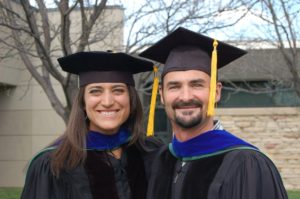
After completing a B.S.E. in exercise science in 2007 at the University of Dayton, Crecelius consulted an adviser about graduate school. She was exploring both research and clinical tracks, and was drawn to institutions west of the Mississippi, having spent some formative years in Colorado. Her adviser connected her to Bob Gotshall, a health and exercise science professor at CSU who is now retired. She was excited by the research opportunities, and dove into her master’s program, studying regulation of muscle blood flow. Working with her faculty mentor, Frank Dinenno, she gained experience in lab research as well as teaching assistantships that helped shape her career.
Balancing action
“I enjoyed what I was doing, so it made the decision to stay for my Ph.D. (in human bioenergetics) easy,” said Crecelius. She liked the department culture, which promoted work/life balance. “Faculty went on bike rides at lunch, or went to Noon Hour Fitness,” she said. Her research also looked at balancing needs. “I was interested in the way the body is able to match the delivery of oxygen to the body’s demand,” she explained.

In her doctoral work, Crecelius investigated the role of specific processes that allow vessels to relax and increase blood flow in different conditions. She translated findings from animal studies and focused on specific pharmacological interventions to understand the specific responses in humans.
Dinenno praised her achievements as a graduate student: “Anne was incredibly productive totaling 22 papers (12 as first author) in high quality peer-reviewed papers, winning numerous local and national research awards.”
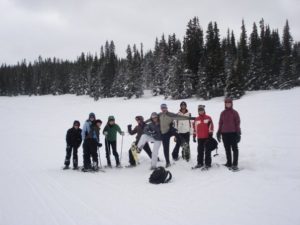 She didn’t limit her experience of challenging the body with exercise and hypoxia to the lab; she found ways to experience it firsthand. Crecelius fondly remembers breathing deeply and straining her muscles with other CSU graduate students in an annual backcountry trip, snowshoeing to the 10th Mountain Division huts high in the Rockies.
She didn’t limit her experience of challenging the body with exercise and hypoxia to the lab; she found ways to experience it firsthand. Crecelius fondly remembers breathing deeply and straining her muscles with other CSU graduate students in an annual backcountry trip, snowshoeing to the 10th Mountain Division huts high in the Rockies.
Among the connections she made both in and out of the lab was Brett Kirby (B.S., ’04; M.S., ’07; Ph.D., ’10), the first human bioenergetics Ph.D. graduate at CSU, who established research protocols that influenced Crecelius’s own. Successive students have extended their own branches of the inquiry and strategies. “The academic family tree is strong in terms of techniques,” Crecelius noted.
Connecting for balance
“So much of what I’m able to pass on to students today in the lab, research, and classroom is because of the mentoring environment at Colorado State,” Crecelius said. Her research, paired with teaching assistantships, kick-started her career, and checked all the necessary boxes to be competitive for a tenure-track faculty appointment at her undergraduate alma mater.
Another key factor: building connections. “Frank taught us that,” she said. Dinenno took graduate students to professional conferences, modeling networking and introductions that set students up for next steps in careers in research, academia, and clinical applications.
While she felt well-prepared to meet tenure expectations with her research credentials, at the University of Dayton, Crecelius shifted her energy to service and teaching responsibilities. She applied her tried-and-true research mentality to teaching: explore past research, try things, gather data, assess outcomes.
She was fascinated by the research she found on teaching and learning. Her teaching philosophy is modeled on what she experienced at CSU: “Be humble. Be willing to learn and adapt. There is always going to be someone who knows more than you do. There is a difference between having expertise in a topic and being an expert in everything.”
“In essence, she serves as an advocate for the study of human physiology at-large and uses a data driven, science-based approach to understanding curricular needs to better align institutions nationally and globally on how to best educate students,” Dinenno explained of Crecelius’s mastery of teaching and advocacy for physiology education standards.
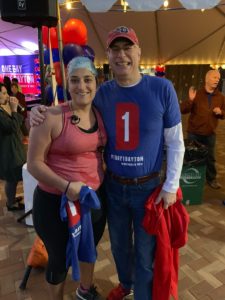
University of Dayton’s president, Eric Spina, cited Crecelius’s CSU education and personal drive that set her up for success in academia. “Anne’s is a story of an extraordinarily well-prepared and highly motivated junior faculty member choosing to maximize her impact by doing creative and important service, supporting extraordinary student learning, and performing widely recognized research – truly succeeding in all phases of faculty life while advancing her career and improving the University of Dayton.”
In her second year as a faculty member at UD, Crecelius received some challenging news: her own stage III breast cancer diagnosis. She researched options, and pursued aggressive treatment including surgery, chemotherapy, and radiation, while maintaining her teaching, advising, and service activities. She wrote about sharing her diagnosis with students in her physiology class; Science magazine featured her essay about the experience.
Disconnecting for balance
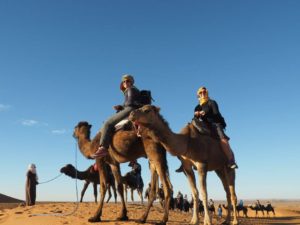
To this day, Crecelius carves out time for international and backcountry travel to be “forcibly disconnected” from technology, finding it a refreshing way to keep life in balance.
Her connections among peers at other institutions – such as that with her nominator – have led to lifelong friendships and adventures. “Erica texted me and said, ‘there’s a good deal on a trip to Morocco – want to go?’” Crecelius again applied her “say ‘yes’ mentality,” as she did with immersive international study abroad experiences with students in Chile, Spain, and Portugal. “You can’t beat getting paid to ride horses on the beach with students,” she said.
‘Connect and understand’
While the entire world reeled in March 2020, Crecelius’s resilience was tested again. “The pandemic has brought humanity into focus for a lot of educators,” she said. As interim department head, Crecelius was in a Zoom meeting with faculty planning how to maintain connection and student learning despite campus closures and pivots to online classes. Her oncologist called during the meeting with more heartbreaking news: Her breast cancer had returned and was now stage IV.
“Sometimes life hits you with big messy complex stuff that really doesn’t have a good answer. You can wallow and complain, or you can adapt and modify your life to become accustomed to it,” Crecelius said. Her personal experiences, paired with her innate drive, push her to share lessons with her students: “Go do the thing. Pursue opportunities. Pack a lot in. Ask for grace. Connect and understand.”
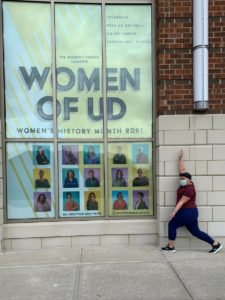
University of Dayton’s Women’s Center honored Crecelius with a Women of UD Award in 2021, where the theme was Leading with Character and Resilience. “The idea of resilience, for me, has definitely been multifactorial in the past few months, trying to manage how to be a strong leader and have an impact, and yet also prioritize myself, because I need to.”
Spina addressed Crecelius’s contributions to the University of Dayton. “Through her actions on a daily basis, Anne reminds all of us at UD that we have a sacred obligation to focus on the holistic, values-driven education of our students as future citizen-leaders; that we have the responsibility to put learning and discovery above self; and that we are privileged to lead the life of the mind that we do. CSU should be very proud that one of its still-young alums is a moral leader among the faculty at the University of Dayton. Anne’s impact here and in higher education writ large is terribly impressive, and she certainly deserves this award.”
Dinenno echoed Spina’s praise: “She is an incredible inspiration and example of perseverance and success.”
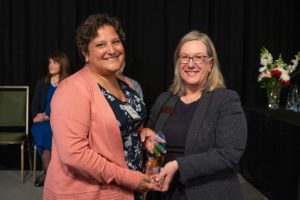
Crecelius applied her research strategy to optimize her travel with Wehrwein to Colorado to accept the CHHS Emerging Leader Alumna award. “It will be nice to look at (CSU) from a faculty perspective,” she said.
The Department of Health and Exercise Science is part of CSU’s College of Health and Human Sciences.
View photos of the College of Health and Human Sciences All-College Awards. Learn about previous recipients.